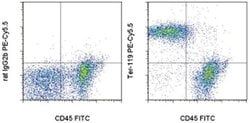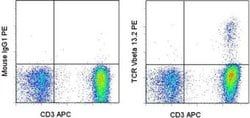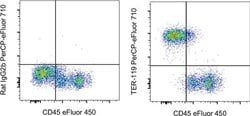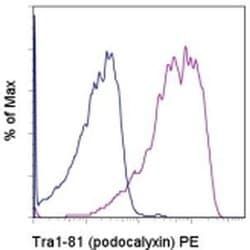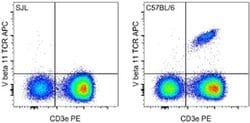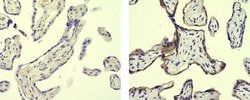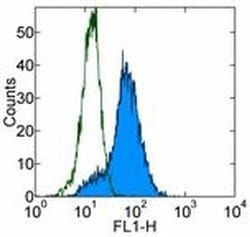50-112-26
TRA-1-60 (Podocalyxin) Monoclonal Antibody (TRA-1-60), PE, eBioscience™, Invitrogen™
Manufacturer: Invitrogen
Select a Size
| Pack Size | SKU | Availability | Price |
|---|---|---|---|
| Each of 1 | 50-112-26-Each-of-1 | In Stock | ₹ 22,606.00 |
50-112-26 - Each of 1
In Stock
Quantity
1
Base Price: ₹ 22,606.00
GST (18%): ₹ 4,069.08
Total Price: ₹ 26,675.08
Antigen
TRA-1-60 (Podocalyxin)
Classification
Monoclonal
Concentration
0.2 mg/mL
Formulation
PBS with 0.09% sodium azide; pH 7.2
Host Species
Mouse
Quantity
100 μg
Primary or Secondary
Primary
Content And Storage
4° C, store in dark, DO NOT FREEZE!
Form
Liquid
Applications
Flow Cytometry
Clone
TRA-1-60
Conjugate
PE
Gene Alias
TRA160; tra60
Purification Method
Affinity chromatography
Regulatory Status
RUO
Target Species
Human
Product Type
Antibody
Isotype
IgM
Description
- Description: The TRA-1-60 antibody recognizes a protein expressed on undifferentiated human embryonic stem cells (ES), embyronal carcinoma cells (EC), and embryonic germ cells (EG)
- Like other stem cell specific markers, the epitope recognized by the TRA-1-60 antibody is lost upon cell differentiation
- Contrary to early reports that the TRA-1-60 epitope can be destroyed by neuraminidase digestion, new strudies have shown that TRA-1-60 recognizes a neurominidase resistent antigen
- The TRA-1-60 antibody is known to specifically recognize a carbohydrate epitope on a keratan sulfated glycoprotein recently identified as podocalyxin, a member of the CD34-related family of sialomucins
- Podocalyxin is a transmembrane glycoprotein originally identified on epithelial glomerular cells known as podocytes, and the protein has also been implicated in the development of aggressiveness in a variety of cancers, including breast and prostate cancer
- Applications Reported: This TRA-1-60 antibody has been reported for use in flow cytometric analysis
- Applications Tested: This TRA-1-60 antibody has been tested by flow cytometric analysis of the human embryonal carcinoma (EC) line 2102Ep
- This can be used at less than or equal to 1 μg per test
- A test is defined as the amount (μg) of antibody that will stain a cell sample in a final volume of 100 μL
- Cell number should be determined empirically but can range from 10^5 to 10^8 cells/test
- TRA-1-60 is a cell surface antigen, expressed along with SSEA-3, SSEA-4 and TRA-1-81 in human embryonic stem cells, embryonal carcinoma cells and induced pluripotent stem cells (iPS)
- These surface markers are lost during the differentiation process
- In contrast, SSEA-1 is absent in undifferentiated human stem cells but is present on the cell surface after retinoic acid mediated differentiation.
Compare Similar Items
Show Difference
Antigen: TRA-1-60 (Podocalyxin)
Classification: Monoclonal
Concentration: 0.2 mg/mL
Formulation: PBS with 0.09% sodium azide; pH 7.2
Host Species: Mouse
Quantity: 100 μg
Primary or Secondary: Primary
Content And Storage: 4° C, store in dark, DO NOT FREEZE!
Form: Liquid
Applications: Flow Cytometry
Clone: TRA-1-60
Conjugate: PE
Gene Alias: TRA160; tra60
Purification Method: Affinity chromatography
Regulatory Status: RUO
Target Species: Human
Product Type: Antibody
Isotype: IgM
Antigen:
TRA-1-60 (Podocalyxin)
Classification:
Monoclonal
Concentration:
0.2 mg/mL
Formulation:
PBS with 0.09% sodium azide; pH 7.2
Host Species:
Mouse
Quantity:
100 μg
Primary or Secondary:
Primary
Content And Storage:
4° C, store in dark, DO NOT FREEZE!
Form:
Liquid
Applications:
Flow Cytometry
Clone:
TRA-1-60
Conjugate:
PE
Gene Alias:
TRA160; tra60
Purification Method:
Affinity chromatography
Regulatory Status:
RUO
Target Species:
Human
Product Type:
Antibody
Isotype:
IgM
Antigen: CD4
Classification: Monoclonal
Concentration: 0.5 mg/mL
Formulation: PBS with 0.09% sodium azide; pH 7.2
Host Species: Rat
Quantity: 25 μg
Primary or Secondary: Primary
Content And Storage: 4° C, store in dark, DO NOT FREEZE!
Form: Liquid
Applications: Immunohistochemistry (Paraffin), Western Blot
Clone: 4SM95
Conjugate: Biotin
Gene Alias: Activation B7-1 antigen; B7; B7.1; B7-1; BB1; B-lymphocyte activation antigen B7; CD28LG; CD28LG1; CD4; CD4 antigen; CD4 antigen (p55); CD4 antigen p55; Cd4 molecule; CD4 precursor; CD4 receptor; CD4, allele 1; cd4a; CD4mut; CD80; CD80 antigen (CD28 antigen ligand 1, B7-1 antigen); CD80 molecule; cell surface glycoprotein CD4; costimulatory factor CD80; costimulatory molecule variant IgV-CD80; CTLA-4 counter-receptor B7.1; fCD4; L3T4; LAB7; Leu-3; Ly-4; lymphocyte antigen CD4; lymphocyte antigen CD4 precursor; membrane protein; p55; T-cell differentiation antigen L3T4; T-cell surface antigen T4/Leu-3; T-cell surface glycoprotein CD4; T-cell surface glycoprotein CD4 precursor (T-cell surface antigen T4/Leu-3) (T-cell differentiation antigen L3T4); T-lymphocyte activation antigen CD80; W3/25; W3/25 antigen
Purification Method: Affinity chromatography
Regulatory Status: RUO
Target Species: Mouse
Product Type: Antibody
Isotype: IgG1 κ
Antigen:
CD4
Classification:
Monoclonal
Concentration:
0.5 mg/mL
Formulation:
PBS with 0.09% sodium azide; pH 7.2
Host Species:
Rat
Quantity:
25 μg
Primary or Secondary:
Primary
Content And Storage:
4° C, store in dark, DO NOT FREEZE!
Form:
Liquid
Applications:
Immunohistochemistry (Paraffin), Western Blot
Clone:
4SM95
Conjugate:
Biotin
Gene Alias:
Activation B7-1 antigen; B7; B7.1; B7-1; BB1; B-lymphocyte activation antigen B7; CD28LG; CD28LG1; CD4; CD4 antigen; CD4 antigen (p55); CD4 antigen p55; Cd4 molecule; CD4 precursor; CD4 receptor; CD4, allele 1; cd4a; CD4mut; CD80; CD80 antigen (CD28 antigen ligand 1, B7-1 antigen); CD80 molecule; cell surface glycoprotein CD4; costimulatory factor CD80; costimulatory molecule variant IgV-CD80; CTLA-4 counter-receptor B7.1; fCD4; L3T4; LAB7; Leu-3; Ly-4; lymphocyte antigen CD4; lymphocyte antigen CD4 precursor; membrane protein; p55; T-cell differentiation antigen L3T4; T-cell surface antigen T4/Leu-3; T-cell surface glycoprotein CD4; T-cell surface glycoprotein CD4 precursor (T-cell surface antigen T4/Leu-3) (T-cell differentiation antigen L3T4); T-lymphocyte activation antigen CD80; W3/25; W3/25 antigen
Purification Method:
Affinity chromatography
Regulatory Status:
RUO
Target Species:
Mouse
Product Type:
Antibody
Isotype:
IgG1 κ
Antigen: Placental Alkaline Phosphatase
Classification: Monoclonal
Concentration: 0.5 mg/mL
Formulation: PBS with 0.09% sodium azide; pH 7.2
Host Species: Mouse
Quantity: 100 μg
Primary or Secondary: Primary
Content And Storage: 4° C, store in dark, DO NOT FREEZE!
Form: Liquid
Applications: ELISA, Immunohistochemistry (Frozen), Immunohistochemistry (Paraffin)
Clone: 8B6
Conjugate: Biotin
Gene Alias: Alkaline phosphatase placental type; Alkaline phosphatase Regan isozyme; alkaline phosphatase, placental; alkaline phosphatase, placental type; alkaline phosphomonoesterase; ALP; Alp1; ALPP; AP-TNAP; DOA1; FLJ11281; FLJ40094; FLJ61142; FLJ93059; Germ-cell alkaline phosphatase; glycerophosphatase; HOPS; MGC161443; MGC167935; nagao Isozyme; P PLAP; PALP; PLA2P; PLAA; placental alkaline phosphatase 1; placental heat-stable alkaline phosphatase; PLAP; PLAP1; PLAP-1; rCG23846-like; Regan isozyme; TNAP; TNSALP
Purification Method: Affinity chromatography
Regulatory Status: RUO
Target Species: Human
Product Type: Antibody
Isotype: IgG2a κ
Antigen:
Placental Alkaline Phosphatase
Classification:
Monoclonal
Concentration:
0.5 mg/mL
Formulation:
PBS with 0.09% sodium azide; pH 7.2
Host Species:
Mouse
Quantity:
100 μg
Primary or Secondary:
Primary
Content And Storage:
4° C, store in dark, DO NOT FREEZE!
Form:
Liquid
Applications:
ELISA, Immunohistochemistry (Frozen), Immunohistochemistry (Paraffin)
Clone:
8B6
Conjugate:
Biotin
Gene Alias:
Alkaline phosphatase placental type; Alkaline phosphatase Regan isozyme; alkaline phosphatase, placental; alkaline phosphatase, placental type; alkaline phosphomonoesterase; ALP; Alp1; ALPP; AP-TNAP; DOA1; FLJ11281; FLJ40094; FLJ61142; FLJ93059; Germ-cell alkaline phosphatase; glycerophosphatase; HOPS; MGC161443; MGC167935; nagao Isozyme; P PLAP; PALP; PLA2P; PLAA; placental alkaline phosphatase 1; placental heat-stable alkaline phosphatase; PLAP; PLAP1; PLAP-1; rCG23846-like; Regan isozyme; TNAP; TNSALP
Purification Method:
Affinity chromatography
Regulatory Status:
RUO
Target Species:
Human
Product Type:
Antibody
Isotype:
IgG2a κ
Antigen: CD25
Classification: Monoclonal
Concentration: 0.5 mg/mL
Formulation: PBS with 0.09% sodium azide; pH 7.2
Host Species: Rat
Quantity: 1 mg
Primary or Secondary: Primary
Content And Storage: 4° C
Form: Liquid
Applications: Flow Cytometry
Clone: PC61.5
Conjugate: Unconjugated
Gene Alias: ADA; ADA1; Adenosine aminohydrolase; adenosine deaminase; CD25; CD25 antigen; cytokine receptor; IDDM10; IL 2 RA; IL 2 receptor; IL 2R; IL 2R subunit alpha; IL2 RA; IL2 RA antibody; IL2 receptor; il-2 receptor alpha; IL-2 Receptor alpha chain; IL-2 receptor alpha subunit; IL2 receptor subunit alpha; IL-2 receptor subunit alpha; IL2R; IL-2R alpha; IL-2R alpha chain; IL2R subunit alpha; IL-2R subunit alpha; Il2ra; IL-2RA; IL-2-RA; IL2-RA; Il2ra antibody; IL2RAC; IMD41; interleukin 2 receptor; interleukin 2 receptor alpha chain; interleukin 2 receptor subunit alpha; interleukin 2 receptor, alpha; interleukin 2 receptor, alpha chain; interleukin-2 receptor alpha; interleukin-2 receptor alpha chain; interleukin-2 receptor alpha subunit; interleukin-2 receptor beta chain; Interleukin2 receptor subunit alpha; interleukin-2 receptor subunit alpha; Ly-43; p55; p55 chain; sIL 2R; soluble IL 2 receptor; TAC antigen; TCGFR
Purification Method: Affinity chromatography
Regulatory Status: RUO
Target Species: Mouse
Product Type: Antibody
Isotype: IgG1 λ
Antigen:
CD25
Classification:
Monoclonal
Concentration:
0.5 mg/mL
Formulation:
PBS with 0.09% sodium azide; pH 7.2
Host Species:
Rat
Quantity:
1 mg
Primary or Secondary:
Primary
Content And Storage:
4° C
Form:
Liquid
Applications:
Flow Cytometry
Clone:
PC61.5
Conjugate:
Unconjugated
Gene Alias:
ADA; ADA1; Adenosine aminohydrolase; adenosine deaminase; CD25; CD25 antigen; cytokine receptor; IDDM10; IL 2 RA; IL 2 receptor; IL 2R; IL 2R subunit alpha; IL2 RA; IL2 RA antibody; IL2 receptor; il-2 receptor alpha; IL-2 Receptor alpha chain; IL-2 receptor alpha subunit; IL2 receptor subunit alpha; IL-2 receptor subunit alpha; IL2R; IL-2R alpha; IL-2R alpha chain; IL2R subunit alpha; IL-2R subunit alpha; Il2ra; IL-2RA; IL-2-RA; IL2-RA; Il2ra antibody; IL2RAC; IMD41; interleukin 2 receptor; interleukin 2 receptor alpha chain; interleukin 2 receptor subunit alpha; interleukin 2 receptor, alpha; interleukin 2 receptor, alpha chain; interleukin-2 receptor alpha; interleukin-2 receptor alpha chain; interleukin-2 receptor alpha subunit; interleukin-2 receptor beta chain; Interleukin2 receptor subunit alpha; interleukin-2 receptor subunit alpha; Ly-43; p55; p55 chain; sIL 2R; soluble IL 2 receptor; TAC antigen; TCGFR
Purification Method:
Affinity chromatography
Regulatory Status:
RUO
Target Species:
Mouse
Product Type:
Antibody
Isotype:
IgG1 λ


